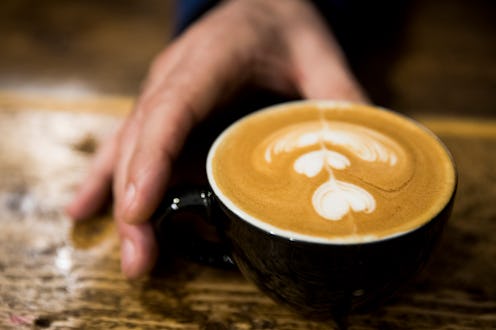Life
Your Mid-Morning Coffee Could Give You This Surprising Health Boost

When I was growing up, caffeine had a bad rap. My mother always told me I couldn't drink coffee till I turned 18 because it would stunt my growth, give me ulcers, and saddle me with a colorful variety of other negative side effects. But recent evidence has suggested coffee may have benefits, and likewise, a new article published in the Journal of the American College of Cardiology has suggested that caffeine itself may actually be good for our hearts.
As much as 85 percent of people in the U.S. consume at least one caffeinated beverage per day, according to a 2016 study out of the University of Washington, and it probably won't surprise you to know that caffeine intake is "largely driven by coffee consumption," along with tea and energy drinks. And according to ABC News, caffeine doesn't exactly have a reputation for being heart-healthy, considering "greater than 80 percent of doctors in the U.S. recommend against caffeine consumption in patients with known abnormal heart rhythms."
But since some also consider caffeine an antioxidant and since "heart doctors do not have great evidence that caffeine causes abnormal heart rhythms," the authors behind this newly published article collected information from numerous studies "to add scientific data to the debate on caffeine" — and arrived at the conclusion that caffeine may be better for the ol' blood pumpin' muscle than previously thought, ABC News reported.
“There is a public perception, often based on anecdotal experience, that caffeine is a common acute trigger for heart rhythm problems,” Dr. Peter Kistler, one of the article authors and director of electrophysiology at Alfred hospital and Baker Heart and Diabetes Institute, told The Guardian. “Our extensive review of the medical literature suggests this is not the case.”
According to their article, the authors looked at multiple population-based studies to "determine an association between caffeine intake and its effects on atrial and ventricular arrhythmias." To put it extremely basically and non-scientifically, the article authors wanted to see if caffeine, once in our systems, can junk up our heart rhythms.
The article authors were particularly concerned with the abnormal heart rhythm known as atrial fibrillation, which affects about 11 percent of people in the U.S., according to the Centers for Disease Control and Prevention (CDC). Atrial fibrillation causes "the normal beating in the upper chambers of the heart [to be] irregular, and blood doesn’t flow as well as it should from the atria to the lower chambers of the heart," the CDC reported.
If you've ever drunk caffeine to fuel a late-night study session and suddenly felt like your body was moving at the speed of light (been there), you may think it's likely caffeine could cause your heart to beat arrhythmically. But for most of us, that's not so, the article authors suggest. In fact, the studies they collected "consistently showed a decrease in atrial fibrillation (AFib) with an increase in caffeine ingestion, with one meta-analysis of 228,465 participants showing AFib frequency decreasing by 6 percent in regular coffee drinkers, and a further analysis of 115,993 patients showing a 13 percent risk reduction." Dang.
The article authors did mention that they found two studies that correlated caffeine with "an increased risk for ventricular arrhythmias," but those studies involved patients who "ingested at least 10 cups and nine cups per day, respectively." Based on the information collected for this article, the authors suggest that 500 milligrams of caffeine daily — or about six cups of coffee, they say — does not "increase the severity or rate of ventricular arrhythmias" in people who do not already have abnormal heart rhythms. For people who already have arrythmias, they estimate 300 milligrams may be safe.
But that doesn't mean everyone should leap at the chance to drink down as much caffeine as possible, the authors add. They caution that "there may be individual differences in susceptibility" to caffeine, and that "up to 25 percent of patients [already diagnosed with atrial fibrillation] report coffee as a AFib trigger." They also suggest patients with pre-existing heart conditions avoid energy drinks, and noted that palpitations occurred in patients with heart conditions who consumed two or more energy drinks per day.
Overall, "Caffeinated beverages such as coffee and tea may have long term anti-arrhythmic properties," Kistler told The Guardian. "In numerous population-based studies, patients who regularly consume coffee and tea at moderate levels have a lower lifetime risk of developing heart rhythm problems and possibly improved survival."
And while, of course, further study and more information is needed, I'm still totally running with that and declaring my morning caramel macchiato necessary for my survival.